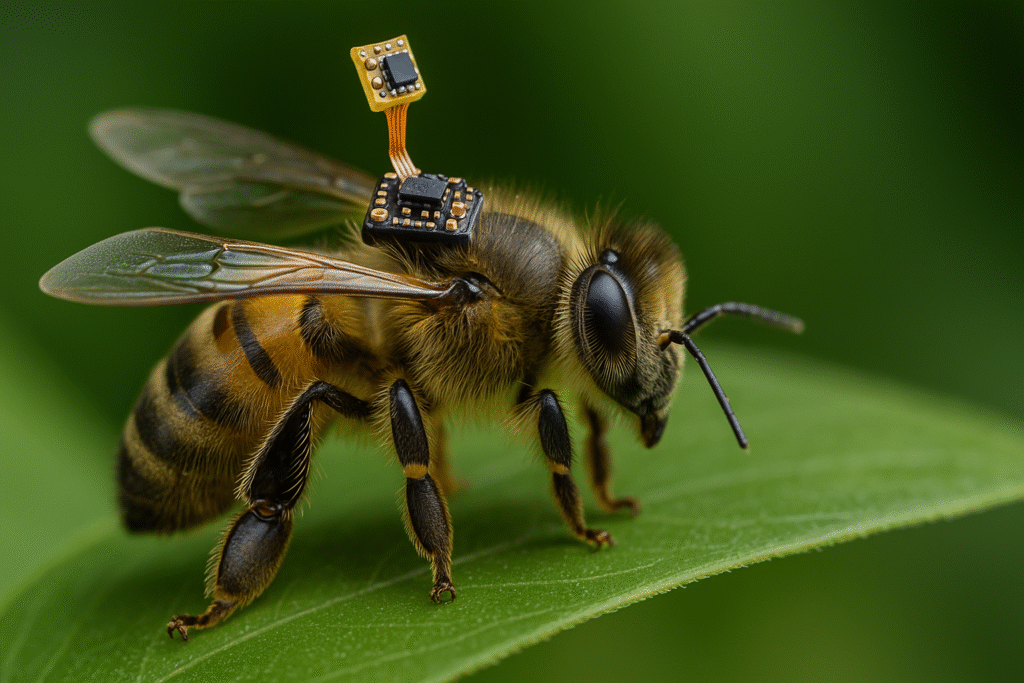In an unprecedented technological leap, Chinese scientists have unveiled the world’s first cyborg bee, integrating cutting edge neuroscience and robotics with nature’s most efficient pollinator. Developed at the prestigious Beijing Institute of Technology, this tiny marvel features a brain controller weighing just 74 milligrams lighter than a bee’s own nectar sack. This invention could change the future of agriculture, surveillance, and bio robotics as we know it.
The Technology Behind the Cyborg Bee
At the center of this innovation is Professor Zhao Jieliang, whose team has been working tirelessly to bridge biological efficiency with micro electronic engineering. The cyborg bee utilizes a miniature brain machine interface (BMI) that communicates directly with the bee’s central nervous system. Unlike previous drone technologies, this approach does not merely mimic a bee but controls a living one through precise neural stimulation.
The brain controller, just 74 milligrams in weight, is lighter than the nectar load a worker bee typically carries during pollination. This ensures that the bee’s natural flight pattern and behavior remain largely unaffected, allowing it to continue flying up to 5 kilometers without fatigue.
Real World Case Study Agricultural Applications in Hebei
To test the practical implications, researchers released a batch of these cyborg bees in controlled greenhouses in Hebei province. The goal: to guide pollination more efficiently during tomato and strawberry blooming cycles. Traditional pollination methods were falling short due to the declining bee population in the region.
Over a 10 day period, greenhouses with cyborg bee support reported a 25% higher fruit yield compared to those relying on natural pollinators alone. Moreover, bee activity could be adjusted in real-time using low energy Bluetooth signals. Farmers were astounded by the precision and reduced dependence on expensive manual pollination or synthetic growth hormones.
A Paradigm Shift in Bioengineering
Dr. Lin Mei, a neuro engineering expert from Tsinghua University, calls this development “the beginning of a new age in human insect collaboration.” “The cyborg bee project demonstrates how far we’ve come in merging biology with computation. This tiny controller is a marvel. It neither hinders the bee’s natural ability nor interferes with its survival instincts. It’s a symbiosis of nature and technology,” Dr. Mei said.
She also emphasized the broader implications beyond agriculture, such as environmental monitoring, hazardous material detection, and even search and rescue operations in collapsed buildings where drones cannot maneuver efficiently.
From a Beekeeper’s Perspective
Jiang Wei, a 52 year old beekeeper in Shandong province, initially feared that this technological advancement would make traditional beekeeping obsolete. However, after participating in a research-backed pilot program, his views changed.
“I thought these cyborg bees would be like tiny robots replacing the real thing. But it turns out they need our bees to work! It’s like they become smarter helpers rather than replacements,” said Jiang. “Now, I can help guide them to weaker crops and make sure everything gets pollinated evenly.”
His farm saw a 30% increase in honey production that season, directly attributed to better targeted pollination and less bee exhaustion.
Ethical Questions and Environmental Considerations
Despite the excitement surrounding the cyborg bee, concerns are rising in the scientific community about ethics and ecological impact. Could altering the behavior of pollinators disrupt natural ecosystems? Will bees become too reliant on artificial control? Professor Zhao addressed these concerns during a press briefing.
“We’re not altering the bee’s genes or forcing it to act unnaturally. We are merely guiding its pre-existing instincts for human benefit. However! we are conducting long term studies to monitor potential ecological effects.” International bioethics panels have also been looped into ongoing research, ensuring that the cyborg bee remains a tool for enhancement not exploitation.
Why This Matters Globally
The United Nations has warned of an impending pollination crisis, with bee populations in sharp decline due to pesticides, habitat loss, and climate change. Pollinators contribute to over $235 billion worth of crops annually worldwide.
The cyborg bee offers a glimmer of hope. Unlike mechanical drones that are expensive and energy hungry, bio cybernetic bees are self sustaining. They feed themselves, navigate better than any GPS guided device, and adapt to environmental changes in real time.
Moreover! China’s innovation could serve as a blueprint for other countries facing pollination crises. Researchers in Europe and the U.S are already expressing interest in adapting the brain controller for use in local bee species.
The Future is Buzzing
The development of the cyborg bee marks an extraordinary chapter in the saga of human ingenuity. With the world’s lightest brain controller, Chinese scientists have not only created a bio technological marvel but also potentially offered a solution to the looming agricultural challenges of our era.
As this tiny marvel hovers between flower petals and artificial intelligence, it brings us one step closer to a future where nature and technology are no longer at odds but allies.

